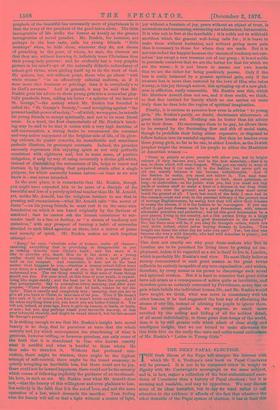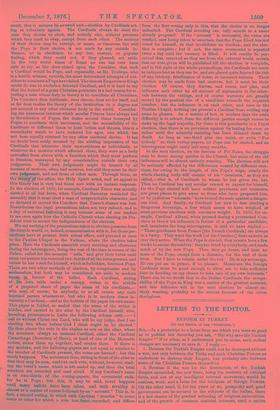THE NEXT PAPAL ELECTION.
THE fresh illness of the Pope will sharpen the interest with which Mr. T. A. Trollope's new book on Papal Conclaves will be perused. It is not to be compared either in weight or dignity with Mr. Cartwright's monograph on the same subject, and is, in fact, rather a collection of the best-authenticated anec- dotes of Conclaves than a history of Papal elections ; but it is amusing and readable, and may be opportune. We may discuss some of its ideas hereafter, but to-day we want rather to call attention to the evidence it affords of the fact that whatever the other demerits of the Papal system of election, it has at least this
merit, that it secures its avowed end—election by Cardinals act- ing as voluntary agents. The Cardinals always do elect the man they choose to elect, and nobody else, without pressure -which they need to obey, except from each other. The motives of their choice may be corrupt, or mean, or timorous, but still the Pope is their choice, is not made by any outside in- fluence, or in obedience to any law, custom, or popular feeling, which they could not, if they pleased, set aside. In the very worst times of Rome no one has ever been able to say, as the door closed upon the Conclave, that such a Cardinal would be Pope, and repeatedly, as Mr. Trollope, who is a hostile witness, records, the most determined attempts of out- siders to nominate a Pope have failed. The utmost Emperors or Kings eould do was to exclude a detested Cardinal, and it is hard to say that the hatred of a great Christian potentate is a bad reason for re- jecting a man whose duty in theory is to conciliate all Christians. The Conclave does deliberate, does choose, does act for itself, and so far does realise the theory of the institution to a degree not yet secured in any other electoral body in the world. Consider- ing the enormous interest which secular Princes have always had in the selection of Popes, the desire several times betrayed by Popes to nominate their successors, and the accessibility of the Cardinals at different times to both bribes and threats, this is a remarkable result to have endured for ages, one which has not been equally attained by any other electoral device. It has no doubt been really secured by the abiding impression of the Cardinals that whatever their unworthiness as individuals, or whatever the motives which affected them, they were as a body entrusted from above with a function which they must perform in freedom, unswayed by any consideration outside their own judgments. Their own judgments might be biassed by all manner of motives, often bad motives, but still they must be their own judgments, and not those of other men. Through them, on the theory of the affair, the Holy Spirit acted, and an appeal to this theorihas in very bad times met with an instant response. In the election of 1605, for example, Cardinal Tosco was actually elected in all but form, when Cardinal Baronius reminded the assembly that it must elect a man of irreproachable character, and so daunted or moved the Conclave that Tosco's chance was lost. Nevertheless the legal precautions taken are very refined, and in .a day of universal balloting it may interest some of our readers to see once again how the Catholic Church when electing its Pre- sident tries to secure the independence of the electors.
We say nothing of the precautions taken to obviate pressure from the outside world, or, indeed, communication with it, for those pre- cautions have at present little actual effect, and proceed at once to the Pauline Chapel in the Vatican, where the election takes place. Here the Cardinals assemble every morning and afternoon during the interregnum, living the rest of the time in rooms of the Palace, called for the moment " cells," and give their votes until some one person has received two-thirds of all the votes present, and unless he has voted for himself, which is forbidden, becomes Pope. There are two other methods of election, by compromise and by acclamation, but both may be considered set aside in modern times in favour of the ballot. Each Cardinal, sitting at his own table under a canopy, writes in the middle of a prepared sheet of paper the name of his candidate,— who may, of course, be anybody, or at all events any male baptised person whatsoever, but who is in modern times in- variably a Cardinal,—and at the bottom of the paper his own name. This paper is folded, so sealed that the name of the writer is hidden, and carried to the altar by the Cardinal himself, who, kneeling, pronounces in Latin the following solemn oath :—" I call to witness Christ our Lord, who will be my judge, that I am electing him whom before God I think ought to be elected." He then places the vote in the chalice or urn on the altar, where the scrutator, always an eminent Cardinal, either the Cardinal Camerlengo (Secretary of State), or head of one of the Monastic orders, mixes them up together, and counts them. If there is any mistake, and the balloting-papers are not equal in number to the number of Cardinals present, the votes are burned ; but this rarely happens. The scrutators then, sitting in front of the altar so that they may be seen, readout each vote, without, however, read- ing the voter's name, which is left sealed up, and then the total numbers are recorded and read aloud. If any Cardinal's name is on two-thirds of the voting-papers, the ceremonial ends, for he is Pope ; but this, it may be said, never happens until many ballots have been taken, and each scrutiny is almost as'a matter of course followed by an " accessit." This is, in fact, a second voting, in which each Cardinal " accedes " to some :lame or other for which a vote has been recorded, and differs from the first voting only in this, that the choice is no longer unlimited. The Cardinal acceding can only accede to a name already proposed.' If the " accessit " is successful, the votes are verified, care being taken to ascertain that the Pope Elect has not voted for himself, as that invalidates an election, and the elec- tion is complete ; but if not, the same ceremonial is repeated twice a day until the vacancy is filled. It will readily be per- ceived that, removed as they are from the external world, certain that no vote given will be published till the election is complete, and in full sight of the whole proceedings, the Cardinals are made as independent as they can be, and are placed quite beyond the risk of any trickery, falsification of votes, or incorrect returns. Their election may be made from bad motives, but it must be their election. Of course, they discuss, and count, and plan, and influence each other by all manner of arguments in the inter- vals between the votings, and of course waverers are greatly moved by the gradual rise of a candidate towards the required number ; but the influence is on each other, and once in the Pauline Chapel, nothing can prevent a Cardinal from writing any name he pleases. As a matter of fact, in modern days the main difficulty is to attract from the different parties enough names to make up the legal majority, for there is this peculiarity in a Papal election, that there is no provision against its lasting for ever, or rather until the minority resisting has been thinned down by death. As long as one-third plus one resist, or write "For nobody" on their voting-papers, no Pope can be elected, and an interregnum might easily last many months.
In the next election, on the decease of Pio Nono, the struggle may be fierce among parties in the Church, but some of the old influences will be almost entirely wanting. The election will not be seriously affected by the differences caused by different crea- tions, for owing to the length of this Pope's reign, nearly the whole electing body will consist of his " creatures," as they are called,—that is, of Cardinals to whom he has given the hat. Then no Cardinal has any secular reward to expect for himself, for the Pope elected will have neither provinces, nor treasures, nor great places to give away to those who have proposed him, or by judicious " accessits " have turned the scale against a danger- ous rival. And finally, no Cardinal has now to fear electing a dangerous Sovereign, a fear which seems to have weighed at seme previous elections with excessive weight. In 1670, for ex- ample, Cardinal Albani, when pressed during a protracted Con- clave to throw his influence in favour of a particular candidate, and terminate the long interregnum, is said to have replied :— " These gentlemen from France [the French Cardinals] are always in a hurry. They want the work [of the Conclave] done as soon as ever they arrive. When the Pope is elected, they remain here a few weeks to amuse themselves; they are feted by everybody, and made much of by the new Pope. Then they go home, and hear no more of the Pope, except from a distance, for the rest of their lives. But I have to remain under the rod ! He is my sovereign. He can put me in prison, if he pleases. Messieurs the foreign Cardinals must be good enough to allow me to take sufficient time in deciding on my choice to take care of my own interests." There can be no doubt that to the Italian Cardinals the accept- ability of the Pope as King was a matter of the greatest moment, and this influence will in the next election be almost en- tirely wanting, probably to the serious increase of the odium theologieum.



































 Previous page
Previous page